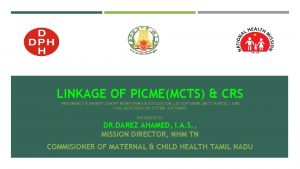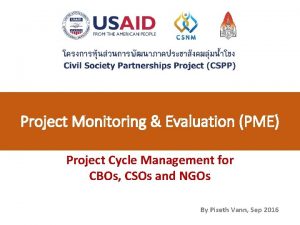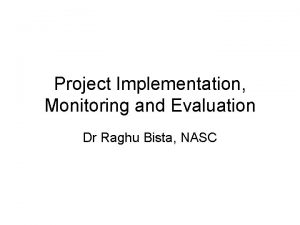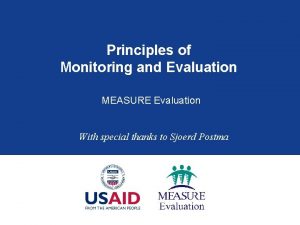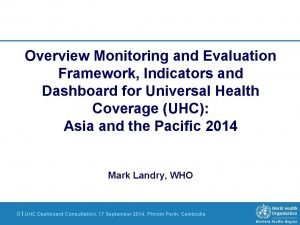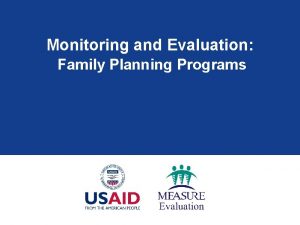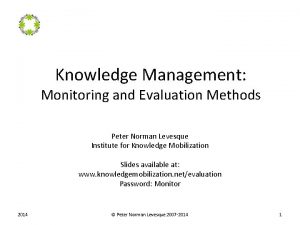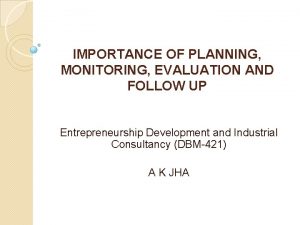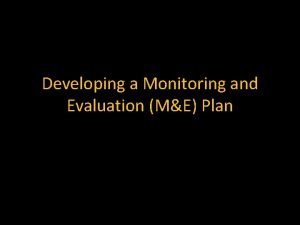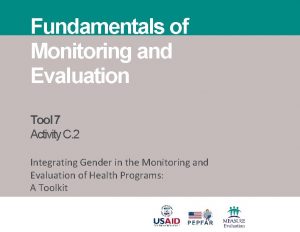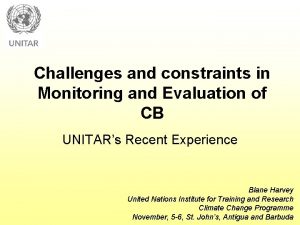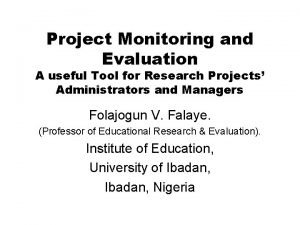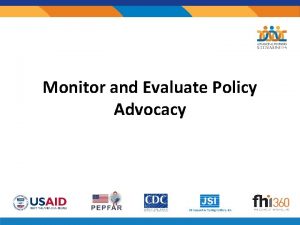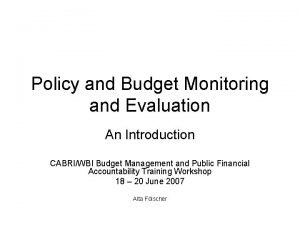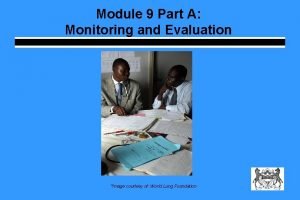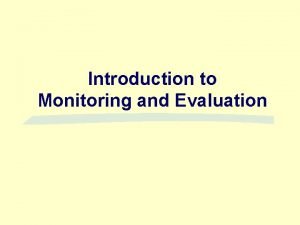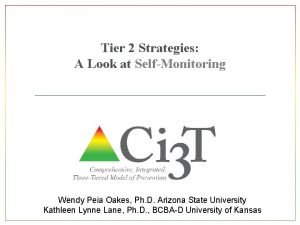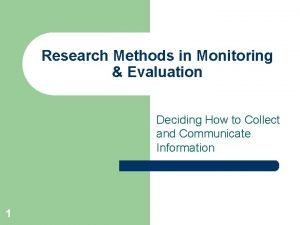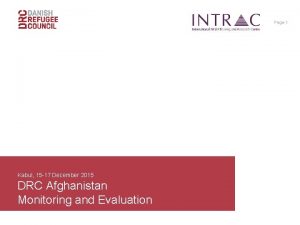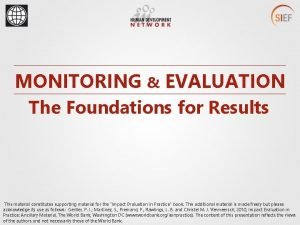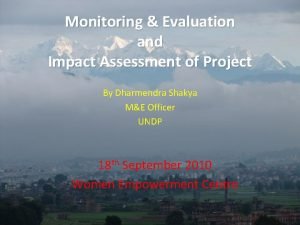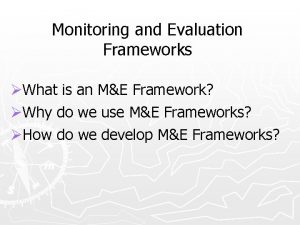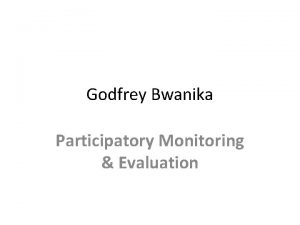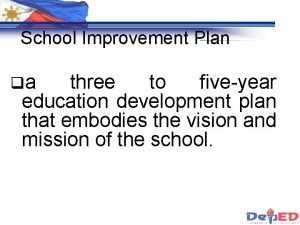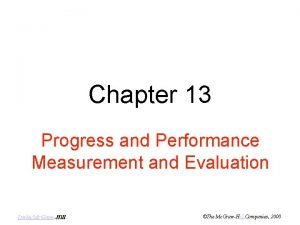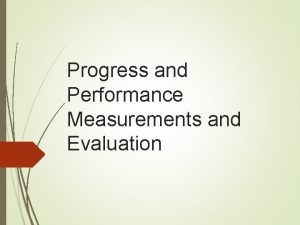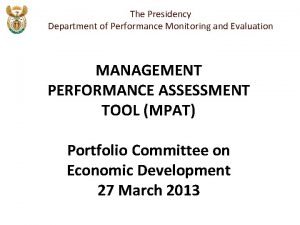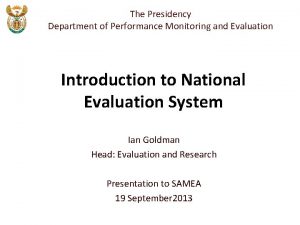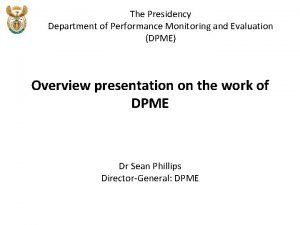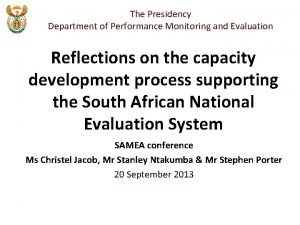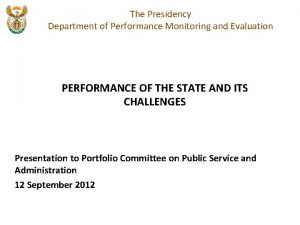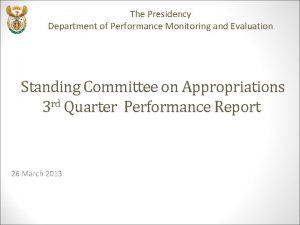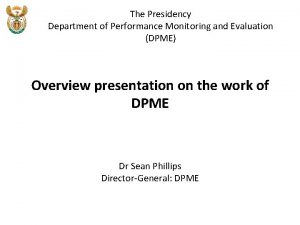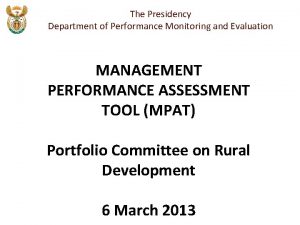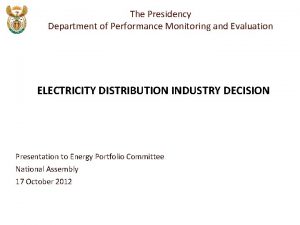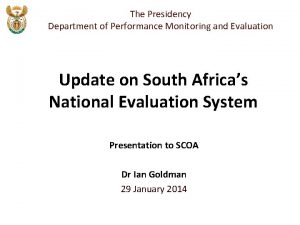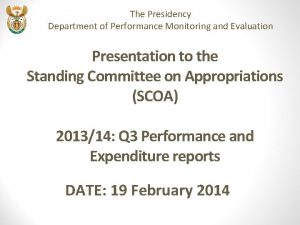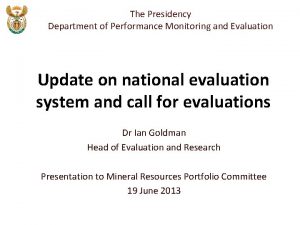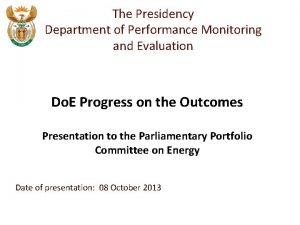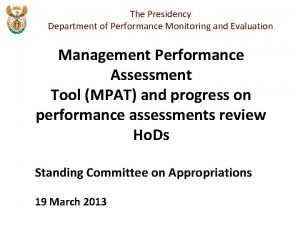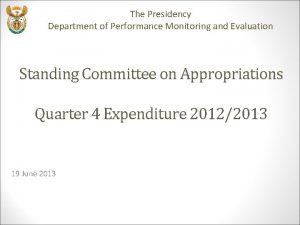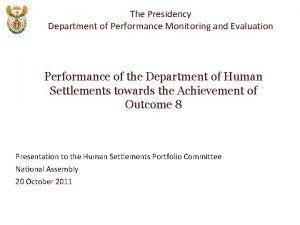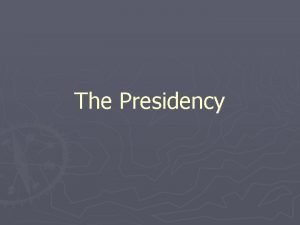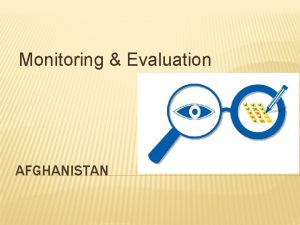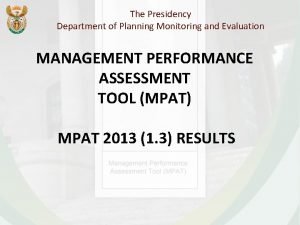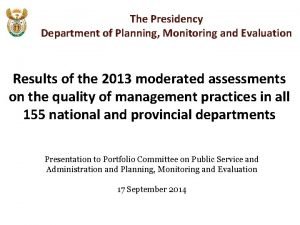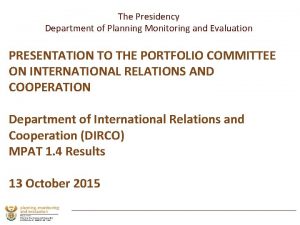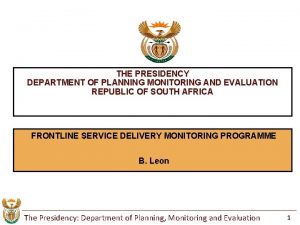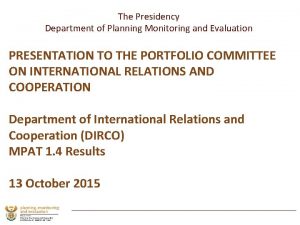The Presidency Department of Performance Monitoring and Evaluation




























- Slides: 28

The Presidency Department of Performance Monitoring and Evaluation South Africa’s National Evaluation System Presentation to Uganda Evaluation Week Nokuthula Zuma and Antonio Hercules 19 -23 May 2014

Outline 1. 2. 3. 4. 5. 6. 7. 8. Establishment of DPME Why evaluation? NEPF and NEP Timeline for developing the system Stage we are at with evaluations? Current status with the evaluation system Use of information by Parliament Conclusions The Presidency: Department of Performance Monitoring and Evaluation 2

Timeline around DPME 2005 Government-wide M&E system document 2007 2008 Framework for Programme Performance Information (Treasury) System for data quality (Stats. SA) 2009 New administration, emphasis on M&E Minister of Performance M&E created Work starts on developing priority outcomes April 2010 DPME created in Presidency, as delivery unit 2010 12 outcomes agreed, Minister’s performance agreements, delivery agreements, quarterly reports 2011 Systems for Management Performance Assessment (MPAT) created with assessment of 103/155 national and provincial departments, monitoring of front-line services developed. June/July Study tour to Mexico/Colombia/US August Draft National Evaluation Policy Framework. October First evaluation starts as pilot for the system November National Evaluation Policy Framework approved by Cabinet The Presidency: Department of Performance Monitoring and Evaluation 3

Why evaluate? Improving policy or programme performance (evaluation for continuous improvement): this aims to provide feedback to programme managers. Evaluation for improving accountability: where is public spending going? Is this spending making a difference? Improving decision-making: Should the intervention be continued? Should how it is implemented be changed? Should increased budget be allocated? Evaluation for generating knowledge (for learning): increasing knowledge about what works and what does not with regards to a public policy, programme, function or organization. The Presidency: Department of Performance Monitoring and Evaluation 5

Scope of the Policy Framework approved Nov 2011 Ø Outlines the approach for the National Evaluation System Ø Obligatory only for evaluations in the national evaluation plan (15 per year in 2013/14), then widen Ø Government wide – focus on departmental programmes not public entities Ø Focus on policies, plans, implementation programmes, projects (not organisations at this stage as MPAT dealing with this) Ø Partnership between departments and DPME Ø Gradually developing provincial (2) and departmental evaluation plans (3) as evaluation starts to gets adopted widely across government Ø First metro has developed a plan (Tshwane) The Presidency: Department of Performance Monitoring and Evaluation 6

Why a National Evaluation Plan Ø Rather than tackling the whole system, focus initially on strategic priorities Ø Allows the system to emerge, being tried and tested in practice Ø Later when we are all clear it is working well, make system wide The Presidency: Department of Performance Monitoring and Evaluation 7

Progress with National Evaluation Plan evaluations Ø 2012/13 National Evaluation Plan approved June 2012, 2013/14 NEP in November 2012, 2014/15 November 2013 § 2012/13: 7 evaluations (NSNP moved to 2014/15) § 2013/14: 15 evaluations (1 agreed by Cabinet to be dropped) § 2014/15: 15 evaluations Ø ECD evaluation completed June last year and on DPME website, 4 others have final reports and gone to Cabinet been in Parliament in April Ø 18 other evaluations underway from 2012/13 and 2013/14 inc 1 not in NEP – 3 completing in a few weeks, 15 underway Ø 15 from 2014/15 TORs mostly developed, procurement started with some – aim for most to be underway by April 2014 – cycle now much earlier (we were at this stage only in May or so in 2013, and September in 2012) The Presidency: Department of Performance Monitoring and Evaluation 8

Priority interventions to evaluate • Large (eg over R 500 million) • or covering a large proportion of the population, and have not had a major evaluation for 5 years. This figure can diminish with time; Linked to 12 -14 outcomes (particularly top 5)/NDP Of strategic importance, and for which it is important that they succeed. • Innovative, from which learnings are needed – in which case an implementation evaluation should be conducted; • Of significant public interest – eg key front-line services. • • The Presidency: Department of Performance Monitoring and Evaluation 9

Implication of evaluation being in National Evaluation Plan Approved by Cabinet and reports will go to Cabinet (with Improvement Plans) Ø Political support from Cabinet and DPME, including to resolve problems emerging Ø Co-funding available from DPME (or if necessary DPME will assist with sourcing donor funding) Ø Have to follow national evaluation system - guidelines, standards, steering committees, training to support Ø All evaluations are partnerships with DPME who will sit on Steering Committee, provide technical support and quality assurance, and be involved in improvement plan. Ø All evaluations published on DPME (and dept? ) website unless security concerns Ø The Presidency: Department of Performance Monitoring and Evaluation 10

Approach - ensuring evaluations are used Ø Key challenge internationally that where evaluations are done, often not used - waste of money Ø Key issues to ensure use: § Departments must own the evaluation concept and the process and so they must request evaluation (not be imposed on them) § There must be a learning focus rather than punitive otherwise departments will just game the system – so punish people not because they make mistakes, but if they don’t learn from their mistakes § Broad government ownership – so selection by crossgovernment Evaluation Technical Working Group – based on importance (either by scale or because strategic or innovative) § Evaluations must be believed - seen as credible § There must be follow-up (so improvement plans) The Presidency: Department of Performance Monitoring and Evaluation 11

Approach – credibility and transparency To ensure credibility: Ø Ensure independence: § Independent external service providers undertake the evaluation, reporting to the Steering Committee § Evaluations implemented as partnership between department(s) and DPME § Steering Committee makes decisions on evaluation not department Ø Ensure quality: § § § Design clinic with top national and international evaluators (giving time free) Peer reviewers (normally 2) per evaluation DPME evaluation director part of whole process Have to follow system - evaluation panel, standards, guidelines, training etc Quality assessment once completed – must score >3/5. (actuals so far 4. 14, 4. 45, 3. 67, 4. 1 3. 71) To ensure transparency: § All evaluation reports go to Cabinet § Then evaluations made public unless security concerns – media briefing, DPME website, Parliament, publication, communication § When complete quality assess and go into Evaluation Repository The Presidency: Department of Performance Monitoring and Evaluation 12

2012/13 Plan 2012 January February June July October 2013 May Timeline around evaluations Develop system for National Evaluation Plan. Call goes out for evaluations for 2012/13 First National Evaluation Plan 2012/13 approved by Cabinet with 8 evaluations Work starts on TORs for 2012/13 evaluations First evaluation from NEP 2012/13 starts Other start soon after 2013/14 Plan 2012 May July Aug Nov 2013 March June 2014 Jan Call goes out for evaluations for 2013/14 15 evaluations approved Training of depts and work starts on TORs Second NEP for 2013/14 approved with 16 evaluations 2014/15 Plan TORs for 15 evaluations for 2013/14 being developed Most underway Call out Selection NEP approved First evaluation complete TORs Start The Presidency: Department of Performance Monitoring and Evaluation 13 First evaluations complete

Evaluation process – 2014/15 Call for evaluations for 2014/15 1 April 2013 Monitoring Improvement Plan Communication of results Improvement Plan drafted <4 months from approval Depts submit concepts for evals – 30 June 2013 2015 Selection by Eval Tech Working Group July 2013 Report public – to Parliament and Website Immediate Results to Cluster and Cabinet 1 -2 months after 2014 2013 Plan submitted into Cluster/Cab system Sept 2013 Management Response/ Quality Assessment 1 month after completion Evaluation completed Oct 2014 to March 2015 Work starts on refining concept Aug/Sept 2013 Cabinet approves Plan Nov/Dec 2013 Evaluation commissioned Feb-May 2014 Finalising TORs, procurement Jan-May 2014 The Presidency: Department of Performance Monitoring and Evaluation 14

Request for management response RECOMMENDATION FROM THE ECD EVALUATION STEERING GROUP 1. A country strategy for ECD should be developed based on a National Integrated Regulatory framework for ECD, from which each department (DBE, DSD, Do. H and if relevant other departments) should develop an implementation programme for their component. A Task Team should be established to produce the Strategy – with clear roles and responsibilities of key players and government departments. The country strategy should be submitted to Cabinet for approval. 1. The national strategy should include a common definition of ECD; agreed provisioning based on age, stage of development, socioeconomic circumstance and needs (including 15 delivery services to reach poor and vulnerable RECORD OF AGREEMENT OR DISAGREEMENT REASONS FOR DISAGREEMENT

Management response 16

Improvement plan The Presidency: Department of Performance Monitoring and Evaluation 17

Evaluations coming through Ø Total of 37 evaluations under National Evaluation System completed, underway or starting (plus 1 other not in NES) § 5 evaluations completed § 3 will finish in the next few weeks, 15 underway, 15 TORs being developed and calls going out. Ø Departments are using evaluation results to inform planning, policy-making and budgeting The Presidency: Department of Performance Monitoring and Evaluation 18

ECD + 2012/13 Plan Department DSD/DBE/Do. H Completed and public Completed Title of evaluation Delays! Progress Trade and Industry Basic Education Rural Development Completed June 2012 Improvement Plan being implemented Implementation/design evaluation of the Business Final report approved Process Services Programme Impact Evaluation of Grade R Final report approved. Implementation Evaluation of the Recapitalisation Final report approved and Development Programme Rural Development Implementation Evaluation of the Comprehensive Final report approved. Rural Development Programme Health Implementation Evaluation of Nutrition Interventions addressing under 5 s Implementation Evaluation of the Urban Settlements Development Grant Implementation Evaluation of the Integrated Residential Development Programme Impact Evaluation of the National School Nutrition Programme Human Settlements Basic Education Diagnostic Review of Early Childhood Development Complete in few weeks Complete in February 2014 SP appointed. Complete May 2014 Underway. Complete August 2014. Stopped. Reallocated to 2014/15. The Presidency: Department of Performance Monitoring and Evaluation 19

NEP 2013/14 Completing by March Underway About to start Delays! Dept Title of evaluation Presidency dti Implementation Evaluation of Government’s Coordination Systems Evaluation of Export Marketing Investment Assistance Incentive programme (EMIAI) Evaluation of Support Programme for Industrial Innovation (SPII) Impact Evaluation of Technology and Human Resources for Industry Programme (THRIP) Evaluation of Military Veterans Economic Empowerment and Skills Transferability and Recognition Programme. Evaluation of National Advanced Manufacturing Technology Strategy Impact Evaluation on Tax Compliance Cost of small businesses Impact evaluation of the Community Works Programme (CWP) Evaluation of the Land Restitution Programme Impact Evaluation CASP Implementation Evaluation of MAFISA Baseline for informal settlements targeted for upgrading Evaluating interventions by DHS to facilitate access to the city. Diagnostic of whether the provision of state-subsidised housing has addressed asset poverty for households and local municipalities Impact Evaluation of the Outcomes Approach dti Military Veterans DST SARS COGTA DRDLR DAFF DHS DHS DPME The Presidency: Department of Performance Monitoring and Evaluation 20

2014/15 Procurement started TORs developed No TORs yet Delays! Dept Evaluation DEA DAFF/DRDLR DAFF Evaluation of the Effectiveness of Environmental Governance in the Mining Sector (EEGM) Design Evaluation of the Policy on Community Education and Training Colleges (PCETC) Impact Evaluation of the Social Housing Programme (SHP) Evaluation of the Indigenous Knowledge Systems Policy (IKSP) Diagnostic Evaluation/Programme Audit for Violence Against Women and Children (AVAWC) Diagnostic Review of Coordination of the Social Sector Expanded Public Works Programme Economic Evaluation of the incremental investment into the SAPS Forensic Services Impact Evaluation of the Ilima Letsema Programme and Irrigation Schemes Impact evaluation of MAFISA (quantitative) – through 3 ie DAFF/DRDLR DBE Policy Evaluation of Small Farmer Support Evaluation of the Funza-Lushaka Bursary Scheme Impact evaluation of National School Nutrition Programme DRDLR Impact evaluation of Land Restitution Programme – through 3 ie DPME Impact/implementation evaluation of the MPAT system Implementation evaluation of the dept strategic planning and APP system DHET DHS DST DSD SAPS The Presidency: Department of Performance Monitoring and Evaluation 21

Some delays Ø Some straightforward Ø Others taking longer than planned: § We procure most and procure within 2 months - some departments taking over 12 months to procure § Challenges with lack of data § Departments wanting to really take on board the evaluation and delaying it getting to cluster and Cabinet § Internal challenges to departments Ø Despite this 38 evaluations in process The Presidency: Department of Performance Monitoring and Evaluation 22

Current use by portfolio committees Ø Basic Education PC had presentation on ECD evaluation by DSD/DBE Ø Mineral Resources PC had presentation on evaluation system and suggested dept propose 3 evaluations (they didn’t) Ø Criminal Justice PC asked Dept of Justice to propose evaluation on Integrated Justice System – agreed for 2015/16 The Presidency: Department of Performance Monitoring and Evaluation 23

Use of evaluations by Parliament Repository provides 70 evaluations which can be a source of evidence now Ø Stage evaluations will be presented at Portfolio Committees: Ø § Once final report approved departments given one month to provide a management response to findings and recommendations § Once management response received depts develop improvement plans § After Cabinet considers a letter sent from DPME to relevant Portfolio Committee with copy of evaluation suggesting relevant department is asked to come and present to the Committee Opportunity for committees to interrogate what depts are doing, ask deep questions as to whether programmes having an impact, are effective, efficient, relevant, sustainable Ø Next evaluations to portfolio committees March/April 2014 Ø Meanwhile Committees could request departments to brief them on progress with evaluations, their results, and the development and implementation of improvement plans based on the results Ø Committees could make suggestions to departments regarding priority areas for evaluation. Call will go out in March 2014 for proposals for evaluations for 2015/16 to 2017/18 – Portfolio Committees could be asking departments to evaluate specific policies or programmes (but closing date for submissions 30 June). The Presidency: Department of Performance Monitoring and Evaluation 24 Ø

Other support for Parliament Ø Briefing of Committee of Chairs on evaluation (twice) Ø Briefing of Committee Researchers on evaluation Ø Invitation to SCOA to SAMEA Conference on Evaluation Ø Organised two study tours for SCOA to US/Canada and Kenya/Uganda Ø Discussing possibility of African Parliamentary Forum on M&E (and invitation to AFREA March 2014) Ø Involving SCOA Chair in South-South Roundtable on Evidence-Based Policy Making and Implementation November 2013 (unfortunately not given permission) The Presidency: Department of Performance Monitoring and Evaluation 25

Progress with the system (1) >12 Guidelines and templates - ranging from TORs to Improvement Plans plus 6 draft ones being finalised February Ø Very significant ones on Planning Implementation Programmes and Design Evaluation – major focus on improving programme design Ø Standards for evaluations and competences, and standards have guided the quality assessment tool Ø 4 courses developed, over 600 government staff trained so far Ø § 1 more courses being developed and piloted by March § Includes course for DGs/DDGs in use of evidence Study tours organised for SCOA to Canada/US, Kenya/Uganda, unfortunately SCOA Chair not able to come to South-South Roundtable Ø Evaluation panel developed with 42 organisations which simplifies procurement - major focus on ensuring universities bid. W Cape now using the panel – may become Government-wide Panel Ø Creation of Evaluation Repository - 70 evaluations quality assessed and on the Evaluation Repository on DPME website. Ø The Presidency: Department of Performance Monitoring and Evaluation 26

Progress with the system (2) Ø Gauteng, W Cape provinces have developed provincial evaluation plans. § DPME working with other provinces – Limpopo, NW, Free State Departmental evaluation plans for dti, DST, DRDLR Ø Municipal evaluation plans – Tshwane developed but not focus at present Ø The Presidency: Department of Performance Monitoring and Evaluation 27

Conclusions In two years the whole system is now established and 38 evaluations are completed, underway, or about to start Ø Interest is growing – more departments getting involved, more provinces, first metro, and more types of evaluation Ø Work on programme planning and design evaluation will potentially have very big impact – will build capacity in departments to undertake Ø Challenges emerging as the evaluation reports start being finalised and the focus shifts to improvement plans Ø § Some gaming by departments as they see critical findings § Need close monitoring of development and implementation of improvement plans to ensure that departments do implement the recommendations Importance of Parliament’s oversight role – committees could request departments to present the evaluation results to them, request departments to present improvement plans to them, and request departments to present progress reports against the improvement plans to them Ø Important for Committees to consider requesting evaluations for 2015/16 cycle – start discussing now Ø The Presidency: Department of Performance Monitoring and Evaluation 28

Thank you Outcomes Manager: OME, DPME Nokuthulaz@po-dpme. gov. za Director: ERU, DPME Antonio. Hercules@po-dpme. gov. za www. thepresidency-dpme. gov. za The Presidency: Department of Performance Monitoring and Evaluation 29
 What is visitor pre registration in picme
What is visitor pre registration in picme Pme management definition
Pme management definition Comparison between monitoring and evaluation
Comparison between monitoring and evaluation Principles of monitoring
Principles of monitoring M&e dashboard
M&e dashboard Monitoring and evaluation of family planning programs
Monitoring and evaluation of family planning programs Knowledge management monitoring and evaluation
Knowledge management monitoring and evaluation Importance of planning, monitoring and evaluation
Importance of planning, monitoring and evaluation Me planning
Me planning Principles of monitoring and evaluation
Principles of monitoring and evaluation Basics of monitoring and evaluation
Basics of monitoring and evaluation Challenges in monitoring and evaluation
Challenges in monitoring and evaluation Centre for evaluation and monitoring
Centre for evaluation and monitoring Difference between monitoring and evaluation
Difference between monitoring and evaluation Monitoring and evaluation in advocacy
Monitoring and evaluation in advocacy Budget monitoring and evaluation
Budget monitoring and evaluation Monitoring and evaluation image
Monitoring and evaluation image Introduction to monitoring and evaluation
Introduction to monitoring and evaluation Monitoring and evaluation tool sample deped
Monitoring and evaluation tool sample deped Research methods in monitoring and evaluation
Research methods in monitoring and evaluation Example of monitoring and evaluation in project proposal
Example of monitoring and evaluation in project proposal Difference between monitoring and evaluation
Difference between monitoring and evaluation Example of monitoring and evaluation in project proposal
Example of monitoring and evaluation in project proposal Me framework
Me framework Smepa deped
Smepa deped Teacher subject improvement plan template
Teacher subject improvement plan template Centre for evaluation and monitoring
Centre for evaluation and monitoring Progress and performance measurement and evaluation
Progress and performance measurement and evaluation Evaluation in progress
Evaluation in progress
